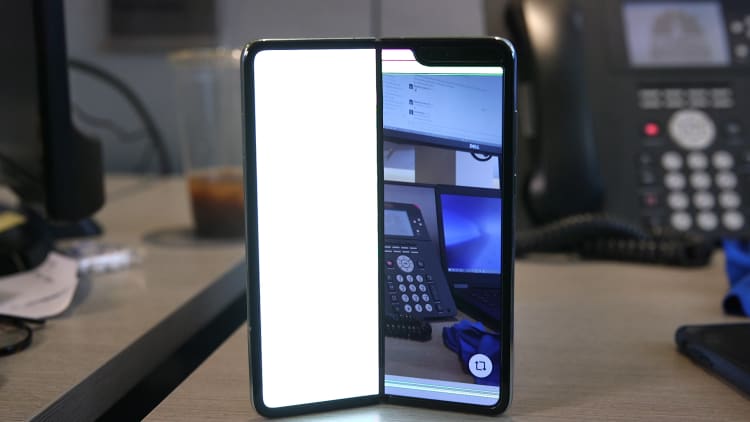The smartphone industry has a two-part plan to tackle a global slowdown in sales: sell a pricey new type of mobile device that is able to transform into a tablet, and promote phones that can support super high-speed mobile internet standard 5G.
But those flashy new features may not be enough to sway people to trade in their old phones immediately, as long as they're in good condition.
Samsung, the world's largest smartphone maker by shipment volume, earlier this year introduced the Galaxy Fold — a nearly $2,000 foldable smartphone that ran into early issues, which delayed its commercial release. Chinese phone maker Huawei, for its part, also announced a foldable phone that will cost around $2,600.
CNBC's "Beyond The Valley" caught up with people on the streets of London, Singapore and Guangzhou, China to ask what they thought of foldable smartphones and the responses were not positive:
"It looks very strange," according to a smartphone user in Guangzhou.
"It's super bulky," said a user in Singapore.

"Phones are supposed to be for calling, for texting and for being connected with the world," a user in London said about her expectations for smartphones. "I don't think that I really need to pay that much to have this because I can pay a lot less and still be satisfied."
Market research firm International Data Corporation said that smartphone shipment volumes for the first quarter of 2019 fell 6.6% on-year after a 4.9% year-over-year decline in the fourth quarter of 2018.
Ben Wood, chief of research at CCS Insight, explained that all smartphone makers face "one over-arching problem" at the moment — their devices look pretty much the same and they have similar functionality. When mobile phones first came out, there was tremendous innovation both in hardware and software, but that's not now the case, according to Wood.
"The marginal gains over the different generation of products started to slow down," he added.
Smartphone makers are also betting on super-fast internet as an incentive to get more people to switch their existing devices for new ones that can support the so-called 5G mobile internet.
South Korea's three mobile carriers as well as Verizon in the U.S. commercially launched their 5G services last month while other countries like China and Japan are racing to launch their own versions of the nascent technology. Still, widespread adoption of 5G will take time since most of the infrastructure around the world is still being built.
But there's some enthusiasm among potential customers of 5G phones.
A user in Guangzhou said he would buy a 5G phone because it is "trendy" but it also has a "better internet system" that would let him do more, including video streaming.
"It just makes everything easier for us, like social media, streaming Netflix and stuff," another user in London said.


